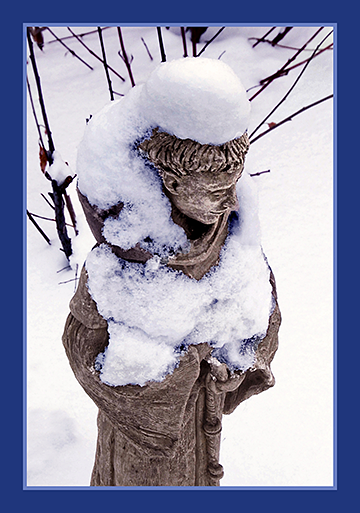We all want peace on Earth, but where on earth do we begin?
COFFEE WITH WARREN, with Warren Harbeck
Cochrane Eagle, December 24, 2015

Snow-draped statue of St. Francis inspired thoughts of peace on earth. Photo by Warren Harbeck
The snow softly embraced the statue of St. Francis that keeps watch over our garden. The stillness of the moment spoke of peace in a world plagued with bitterness and violence.
The scene reminded me of that classic prayer attributed to the thirteenth century saint who has come to symbolize a gentler, more compassionate relationship with all of life:
Lord, make me an instrument of Thy peace;
where there is hatred, let me sow love;
where there is injury, pardon;
where there is doubt, faith;
where there is despair, hope;
where there is darkness, light;
and where there is sadness, joy.
What a vision: that we are called to be agents of peace, love, pardon, faith, hope, light and joy in our broken world!
Over the years, elders of the Stoney Nakoda First Nation have shared with me many of their own insights into what such a calling is all about.
In particular, two living elders, Tina Fox and Roland Rollinmud, of Morley, summarize those seven values in just two Stoney expressions: ahopabi and wazin îchinabi – traditional values first brought to my attention by the late Chief Walking Buffalo (Tatâga Mânî) back in 1965.
Wazin îchinabi, “oneness,” is all about living in harmony – harmony with the Creator, with Nature, and with each other, so fundamental to experiencing oyade, “peace,” and by extension, a place where people live together in peace, that is, a “community.”
Ahopabi, “respect,” is the attitude we must have toward the Creator and toward each other if we ever hope to achieve wazin îchinabi. Such an attitude seeks the wellbeing of others, and not just one’s own wellbeing.
Together, these values speak to me of the kind of peace and goodwill we associate with the Christmas story as recorded in chapter two the Gospel of Luke in the Bible.
Think, for example, of the angelic proclamation to the shepherds at the birth of Jesus. In the words of the King James Version of 1611, the angel says to them:
“Fear not: for, behold, I bring you good tidings of great joy, which shall be to all people. For unto you is born this day in the city of David a Saviour, which is Christ the Lord. And this shall be a sign unto you; Ye shall find the babe wrapped in swaddling clothes, lying in a manger.”
At that moment the angel is joined by “a multitude of the heavenly host praising God, and saying, ‘Glory to God in the highest, and on earth peace, good will toward men.’”
Speaking of things Stoney, back in 1973 a team of folks from Morley published the Christmas story from the Gospel of Luke in the Stoney Nakoda language. If that angelic chorus were singing in Stoney, they might have praised God as follows:
Marhpiya nechagiya îs Wakâ opigijinam.
Ne mâkochî nen îs Wakâ ne ûsinînabi ze ûth
nîhâbi wanîn nîyâhâm.
The familiar words, “on earth peace, good will toward men,” can also be translated as “peace among those whom he favours.” However you translate it, the point of the angelic chorus is that humanity is being blessed with the mercies of God. And the implication for us? To be agents of that mercy for others. As St. Francis puts it in his prayer: “Make me an instrument of thy peace.”
Or, in the words of Jill Jackson and Sy Miller’s popular piece:
“Let there be peace on Earth, and let it begin with me.”
© 2015 Warren Harbeck
JoinMe@coffeewithwarren.com